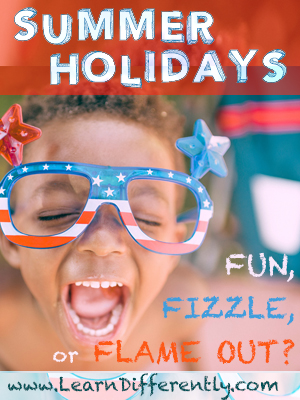Summer Holidays: Fun, fizzle, or flame out?

By Kathy Kuhl For most families, thoughts of a summer holiday–with family picnics, parades, fireworks, and other patriotic celebrations–are happy thoughts. But for some of us with kids who learn differently, they are times of stress. Are you longing for fireworks without emotional fireworks? Cookouts without meltdowns? Parades without panic?
Manage your hopes
You may have fond memories of summer holidays in your childhood. Stop and consider them: sparklers, homemade ice cream, waving flags at a parade, watching fireworks in a crowd downtown. If those are things one or more of your children can’t tolerate, stop and think about what you miss and what you can realistically do.
 As a child, I always enjoyed going downtown with my parents and brother. We’d spread our blue plaid picnic blanket on the grounds of the Washington Monument and wait. Armed with books, crosswords, and one year, my Indian bead loom on which I was weaving a beaded necklace, we waited and waited for darkness. To this day, I can see the brilliant display and hear the loud booms reverberating against the marble museums and offices.
As a child, I always enjoyed going downtown with my parents and brother. We’d spread our blue plaid picnic blanket on the grounds of the Washington Monument and wait. Armed with books, crosswords, and one year, my Indian bead loom on which I was weaving a beaded necklace, we waited and waited for darkness. To this day, I can see the brilliant display and hear the loud booms reverberating against the marble museums and offices.

But when I had my own children, it was not a good event for us to attend. The noise, the massive traffic delays getting home, and the long day were too much for some of us.
It does us no good to mope about what we cannot do. But I would say, pray for grace to adapt. I recognize that not all my readers pray, but all of us can then turn our minds to what we can reasonably hope for on the upcoming holiday. This is much more likely to bring about a happy holiday.
Manage your child’s hopes
Sometimes friends and relatives may enthuse about parades, cookouts, fireworks, or other celebrations in ways that overexcite our kids. Some kids amp themselves up. Any failure of the dream or plan devastates them. This can be true for any child, but can especially impact kids who learn differently.
So listen as your child talks and others talk to your child about events for the holiday. You may need to remind them that, while it’s great fun, there are inconveniences. There may be thunderstorms that cancel the event. There will be mosquitoes, if you live in my part of the world. Don’t be an Eeyore, but help them learn to manage their perspective. See below for more tips on how to help your child turn a realistic perspective into a good plan for enjoyment.
Help your relatives with their expectations
Note first that I didn’t say to manage your relatives’ hopes. You can’t do that. But you can give your family brief reminders of how your child’s issues may affect their participation in the summer holiday. They may not realize or remember, and your reminders may help both them and your child.
So you might tell Grandma, “Mom, you know how Kari gets overexcited when all the cousins are here. If she needs to go by herself to read and calm down for a few minutes, where would be a good place for us to do that? Or I could I’d take her for a walk.”
Or, “Jim, we love the fireworks show you put on at the family Fourth of July Picnic! But I don’t want you to be offended because Kyle is going to be wearing earplugs. You remember how loud noises drive him nuts. He may even feel he has to go out to the car. He would feel bad about missing the show, so would you help us by privately telling him you understand?”
Rehearse and strategize
As you look forward to these summer holidays, like any big events, talk with your kids about what to expect. Break it down: Sitting in the car longer than usual while looking for a parking space before the parade, needing to put on sunscreen, carrying chairs or blankets, how long we’ll wait, what to expect, when we can hope to get home.
Next, help your child think of things to do to help them cope. Maybe they’ll bring something special to do in the car, or choose a favorite hat to wear. Perhaps you’ll all agree to leave early, missing some of the parade, and some of the traffic jam afterwards. Is there a small reward you can offer for good behavior? “If there’s no whining and you treat others kindly, we’ll stop for cold drinks on the way home.”
Then help your child consider how to manage difficult interactions, if you expect any. At the parade or fireworks, what to do if they get lost? At the family picnic, what to do if cousins want to play a game they find boring or too hard?
Too much contact?
And what if Uncle Ed or Aunt Jan wants a hug, and your child doesn’t want to give one? Some of our kids have sensory issues that make hugging painful, but there are other reasons to be thoughtful about this.
My daughter’s rule for her girls is that they don’t have to hug or kiss others; not even us grandparents. No compulsory displays of affection. When my kids were little, I told them they had to give a hug to greet and say goodbye to close relatives, but I was wrong. My daughter’s approach is much wiser. It’s not necessarily the case that your family or mine include sexual predators. But given the statistics, it’s better to teach our kids that physical displays of affection shouldn’t be forced.
However, if you do believe that your children should give hugs, be clear with your kids on what you expect of them. For example: “You have to give Grandma at least a peck on the cheek. But if she hugs you a long time and you don’t like it you may gently pull away and say, ‘Good to see you, Grandma! How’s your new puppy?/trip to Aunt Jo/[insert anything you’re sure she wants to talk about.]'”
(More about relatives and holidays here.)
Change your summer holiday plan
Look forward to the big days. But explain to the kids that you parents reserve the right to change the plan when needed. If the fireworks, parade, picnic, or any celebration have been too much in the past, it may be time to start a new tradition:
- Mylar streamers instead of fireworks.
- Movie night with special treats.
- Visit veterans in a nursing home. Bring your flags to wave.
- A small fireworks display in the backyard, if that’s legal where you are, instead of the more impressive one in town with thousands of people and a traffic jam afterwards.
- No fireworks allowed? Or is it too risky with your impulsive child nearby? Try glow sticks, a bonfire, glow-in-the-dark paint, or party poppers with confetti? Perhaps a family water ballon, water pistol or Nerf gun battle, accompanied by the climax of The 1812 Overture or John Philip Sousa marches.
It’s a summer holiday—an enjoyable celebration. Make it fun, not duty.
How to you help your kids who learn differently enjoy the holidays? Please share your suggestions below.

